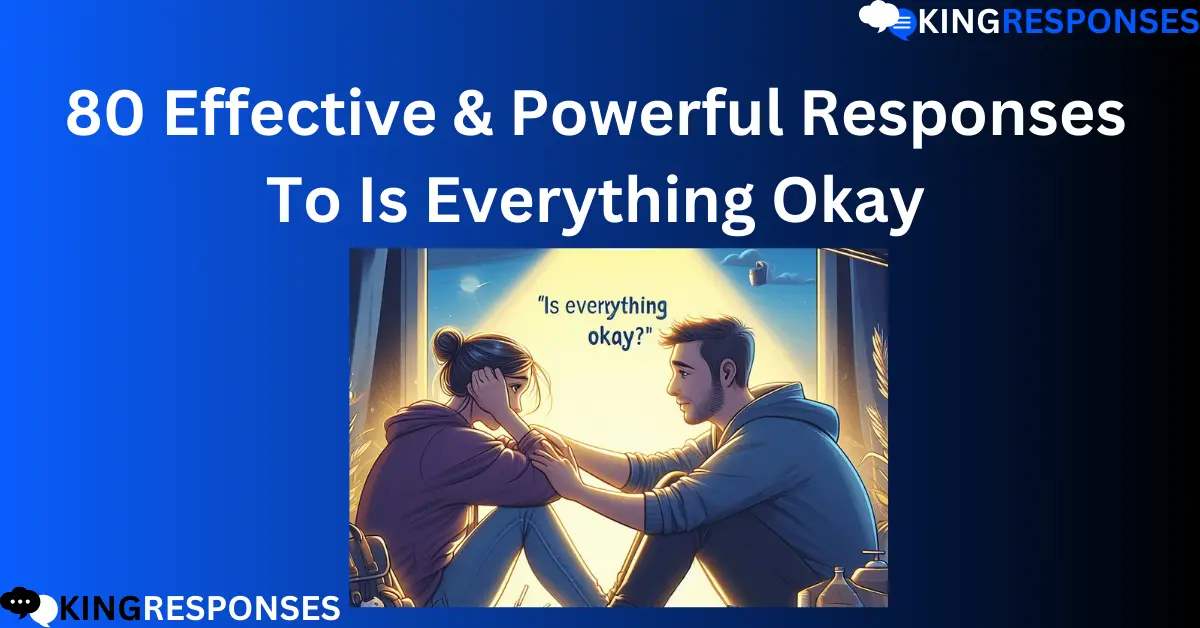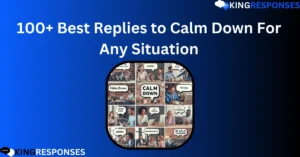Have you ever stopped to consider the weight behind those four words – “Is everything okay?” Such a simple question can carry profound meaning, deeply impacting mental health and relationships. Asking if someone is okay often goes beyond a cursory check-in; it’s a powerful demonstration of care and concern for another person’s well-being. This seemingly simple query can open the door to meaningful conversations and provide much-needed support during difficult times.
This article aims to provide valuable guidance on how to respond to “Is everything okay?” and offer tips for checking in on others in a caring, supportive way. Recognizing the importance of this question, we delve into various responses to “Is everything okay?” tailored to different tones and situations. Whether you’re the one being asked or the one doing the asking, you’ll find helpful insights designed to strengthen connections and foster a compassionate environment.
We’ll explore affectionate replies that strengthen friendships, flirty responses that add some lighthearted banter, and funny comebacks to bring a smile. Additionally, you’ll learn how to approach someone who may be hurting or facing challenges with empathy and compassion. Understanding when and how to offer support is crucial in today’s world, where mental health awareness is more important than ever.
By being attuned to others’ needs and approaching conversations with empathy, we can create profound positive impacts on mental health, relationships, and communities. This article not only provides practical responses but also emphasizes the significance of regular check-ins and the positive ripple effects they can have. Join us as we explore the art of asking “Is everything okay?” and learn how to respond in ways that truly make a difference.
Recognizing When Someone Needs Support
Before you can offer a supportive response, it’s important to identify when someone may be struggling. While not always obvious, there are often physical, emotional, and behavioral cues that someone is going through a difficult time and could use a caring check-in. Here are some potential signs to watch for:
Physical Cues:
- Visible fatigue or exhaustion
- Changes in appetite or weight
- Shifts in personal grooming habits
- Frequent headaches or physical ailments
Emotional Cues:
- Noticeable sadness, irritability or mood swings
- Lack of motivation or disengagement
- Expressions of hopelessness or negativity
- Social withdrawal or isolation
Behavioral Changes:
- Missing work, classes or appointments
- Decline in productivity or performance
- Increased consumption of alcohol or substances
- Lack of participation in once-enjoyed activities
Being able to recognize the signs that someone is struggling with their mental health is crucial,” says Dr. Emily Thompson, a clinical psychologist at Dr. Thompson’s Professional. “Physical, emotional, and behavioral changes can all be indicators that a person needs support. By learning to identify those cues, we can check in with care and compassion before the situation potentially escalates.”
Of course, any single cue doesn’t necessarily indicate someone is struggling. But if you notice patterns of these physical, emotional or behavioral changes, it may signal that your friend, family member or loved one is going through a challenging period. That’s when a compassionate check-in can make a difference.
10 Affectionate Replies to Is Everything Okay
When a friend or loved one asks if you’re okay, sometimes you need a more nuanced response than just “YES” or “NO”. Here are 10 affectionate replies that show appreciation for their concern while leaving room for further discussion:
- “I appreciate you checking in on me. I’m doing okay, just a bit tired.”
- “Thanks for asking. I’m not at my best today, but I’ll be alright.”
- “I’m glad you’re here for me. I’m just having one of those days.”
- “It means a lot that you asked. I’m dealing with something, but I’m handling it.”
- “Thank you for noticing. I’m not okay right now, but I will be.”
- “I’m okay, but can we talk about it later? I appreciate your concern.”
- “I’m not okay, but I’m thankful for your support.”
- “I’m alright, thanks for asking. How about you? Is everything okay with you?”
- “I’m having a tough day, but your asking makes it a bit better.”
- “I’m not great, but I’m grateful you’re here. Let’s chat.”
Example
Tom noticed that his friend, Sarah, seemed a bit off during their lunch break.
Concerned, he gently asked, “Hey Sarah, is everything okay? You seem a bit quiet today.”
Sarah appreciated Tom’s observant nature and replied, “Thanks for asking, Tom. I’ve just had a lot on my mind lately, but I’ll be alright.”
Tom nodded understandingly, “I’m here for you if you ever want to talk about it.
Take your time, and know that I’m here to support you.”
With a grateful smile, Sarah felt comforted by Tom’s caring response,
knowing she had a friend who genuinely cared about her well-being.
10 Flirty Responses to Is Everything Okay
A caring question like “Is everything okay?” can also present an opportunity for some lighthearted flirtation. Try one of these 10 flirty responses to keep things fun and charming:
- “I’m much better now that you’re here. Thanks for asking.”
- “I’m okay, but I’d be even better if we could grab a coffee together.”
- “I’m alright, but your smile would definitely make my day better.”
- “I’m okay, but I’ve been missing you. How about you? Is everything okay with you?”
- “I’m doing well, but I could use a bit of your sunshine.”
- “I’m okay, but I’ve been thinking about you. That always cheers me up.”
- “I’m fine, but I’d be better if we could spend some time together.”
- “I’m okay, but seeing you always makes my day better.”
- “I’m alright, but a compliment from you would make me feel fantastic.”
- “I’m doing well, but I can’t help but wonder… how are you doing?”
Example
During a casual chat at the office, Alex noticed his colleague, Lily, seemed a bit stressed. With a charming smile, he approached her and asked, “Hey Lily, is everything okay? You seem a little tense today.”
Lily chuckled softly and replied, “Thanks for asking, Alex. I’m alright, just dealing with some deadlines.”
Undeterred, Alex leaned in slightly and said, “Well, if you ever need a break from those deadlines, I’m always up for grabbing a coffee together.”
Lily’s cheeks flushed slightly as she laughed, appreciating Alex’s flirtatious yet lighthearted approach. Their conversation took on a playful tone, adding a hint of excitement to the otherwise mundane workday.
10 Funny Responses to Is Everything Okay
If the situation calls for it, injecting some humor and laughter into your reply can be refreshing. Consider these 10 funny comebacks to “Is everything okay?”:
- “I’m okay, but my coffee might need a doctor. It’s not working as usual.”
- “I’m fine, but I think my plant is going through something. It’s been looking a little green lately.”
- “I’m alright, but I can’t say the same for the chocolate bar I just devoured.”
- “I’m okay, but my diet is in critical condition. It’s been hit by a pizza.”
- “I’m doing well, but my laundry pile might reach the ceiling soon.”
- “I’m okay, but my workout routine seems to have pulled a muscle.”
- “I’m fine, but my alarm clock is definitely not. It keeps waking up too early.”
- “I’m alright, but my TV remote ran away with the dish.”
- “I’m doing well, but my car is making some pretty strange noises. I may need to learn some vehicle whispering skills.”
- “I’m doing well, but my socks must be in a fight. They just can’t seem to stay together.”
Example
Alex: Hey, Bailey, is everything okay?
Bailey: I’m okay, but my coffee might need a doctor. It’s not working as usual. (Funny Response)
Alex: Oh no! That sounds like a serious case of caffeine deficiency. Should we call a coffee ambulance?
Bailey: Haha, that might be necessary. But seriously, Alex, I appreciate you checking in on me. I’m doing okay, just a bit tired. (Caring Response)
Alex: I understand, Bailey. Remember, it’s okay to take a break when you need one. And if you ever want to talk about anything, I’m here for you.
Bailey: Thanks, Alex, that means a lot. I’m glad you’re here for me. I’m just having one of those days. (How to Respond When You’re Not Okay)
Alex: We all have those days, Bailey. Just remember, you’re not alone in this. I’m here for you. (Caring Response)
Bailey: Thank you for noticing, Alex. I’m not okay right now, but I will be. (How to Respond When You’re Not Okay)
Alex: Take all the time you need, Bailey. And remember, I’m here if you need to talk.
10 Responses to Is Everything Okay When You’re Not in the Mood
We all have those days when we’re just not in the mood to talk or engage. So, when someone asks, “Is everything okay?” how can you respond without being rude or dismissive? Here are 10 responses that respect your need for space while also acknowledging the other person’s concern:
- “I appreciate you asking, but I’m not really in the mood to talk right now.”
- “Thanks for checking in. I’m okay, just need some quiet time.”
- “I’m alright, but I’m not really up for a chat at the moment.”
- “I’m okay, just having an off day. Thanks for understanding.”
- “Thanks for asking. I’m fine, just need some alone time.”
- “I’m okay, but I’d prefer not to talk about it right now.”
- “I’m alright, just not in the mood for conversation. Thanks for your concern.”
- “I’m fine, but I need some space right now. I appreciate your understanding.”
- “I’m okay, just dealing with some stuff. I’d rather not talk about it.”
- “I’m alright, just need some time to myself. Thanks for asking.”
Example
Sarah had been feeling emotionally drained all day, and when her friend, Emily, approached her with a concerned expression, she knew she had to respond thoughtfully. With a gentle smile, Emily asked, “Hey Sarah, is everything okay? You seem a bit off today.”
Sarah appreciated Emily’s concern but knew she needed some time alone. She replied, “Thanks for checking in, Emily. I’m okay, just need some quiet time to recharge.”
Emily nodded understandingly and said, “I completely understand, Sarah. Take all the time you need. I’m here for you whenever you’re ready to talk.”
With a grateful smile, Sarah felt relieved knowing that Emily respected her need for space while still offering support. Their friendship remained strong, even during moments of silence.
10 Caring Replies to Is Everything Okay
When someone asks if everything is okay, it’s a clear indication of their concern and willingness to support. Here are ten caring replies to convey appreciation and openness for their genuine care:
- “Thank you for asking. I’m going through a rough patch, but your concern means the world to me.”
- “Things have been challenging lately, but knowing you’re there to check in on me truly lifts my spirits.”
- “I’m managing, but your kindness in asking genuinely touches my heart. Thank you for being there.”
- “It’s been a tough day, but your thoughtfulness in asking reminds me that I’m not alone in facing challenges.”
- “Thank you for checking in. I’m okay for now, but it means a lot to know that you’re there if I need someone to talk to.”
- “I’m hanging in there, but your concern is like a beacon of light guiding me through darker times. Thank you.”
- “I’m struggling a bit, but your caring nature gives me strength to keep going. Thank you for always being there.”
- “Things haven’t been easy, but your genuine concern is like a warm embrace during cold moments. Thank you for caring.”
- “I’m okay for now, but your kindness in asking reminds me of the beauty of having someone who truly cares. Thank you.”
- “Thank you for asking. It’s been a challenging time, but having someone like you who genuinely cares makes it easier to navigate through.”
Example
After a long and tiring day, Emma received a message from her friend, David, asking, “Hey Emma, is everything okay? You seemed a little off when we spoke earlier.”
Feeling touched by David’s concern, Emma replied, “Thank you for asking, David. I’m going through a rough patch, but your concern means the world to me.”
David responded with empathy, “I understand, Emma. Things can be tough sometimes. Just know that I’m here for you whenever you need to talk or if you just need someone to listen.”
With a sense of relief, Emma felt grateful for David’s caring nature, knowing she had someone to lean on during difficult times.
Asking Is Everything Okay When Someone Isn’t in the Mood
Approaching someone who appears downcast or distant requires a delicate touch. It’s essential to express concern without overwhelming them further. Here are ten considerate ways to ask “Is everything okay?” when someone seems out of sorts:
- “Hey, I noticed you seem a bit off today. Is everything okay?”
- “You seem quieter than usual. Are you feeling alright?”
- “I can tell something’s on your mind. Do you want to talk about it?”
- “You seem a little distant. Is there anything bothering you?”
- “You don’t seem like yourself today. Is everything going okay?”
- “I sense that something might be bothering you. Would you like to share?”
- “You seem a bit down. Do you need some space or someone to talk to?”
- “I’ve noticed a change in your mood. Is there anything I can do to help?”
- “You seem upset. Would you like to talk about what’s on your mind?”
- “You seem troubled. I’m here if you need someone to listen or support you.”
Example
Sarah noticed that her friend, Jake, seemed unusually quiet and withdrawn during their lunch break. Sensing his somber mood, she approached him gently and asked, “Hey Jake, I noticed you seem a bit off today. Is everything okay?”
Jake looked up, surprised by Sarah’s perceptive question. He sighed softly and replied, “Thanks for asking, Sarah. I’m just feeling a bit overwhelmed with work lately.”
Sarah nodded understandingly and said, “I understand, Jake. If you ever need to talk or if there’s anything I can do to help, just know that I’m here for you.”
Feeling relieved by Sarah’s caring gesture, Jake managed a small smile, grateful for her support during a challenging time.
Asking Is Everything Okay When Someone Is Hurt
When someone is visibly hurt, whether emotionally or physically, it’s crucial to approach them with care and compassion. Here are ten thoughtful ways to inquire if everything is okay when someone is experiencing distress:
- “I noticed you’re not yourself today. Are you okay? Did something happen?”
- “You seem upset. Is there anything I can do to help or support you right now?”
- “I can see that something’s bothering you. Would you like to talk about it?”
- “You look like you’re in pain. Do you need assistance or someone to talk to?”
- “I’m sensing that something is troubling you. Would you like to share what’s on your mind?”
- “You seem shaken up. Would you like to take a moment to talk about what’s bothering you?”
- “I’m here for you if you need someone to listen or offer support. Would you like to talk?”
- “I noticed you’re feeling down. Is there anything specific that’s causing you distress?”
- “You seem to be in discomfort. Is there anything I can do to help alleviate it?”
- “I see you’re hurting. Please know that I’m here for you, no matter what. Do you want to talk about what’s troubling you?”
Example
As Emily sat alone in the break room, tears streaming down her cheeks, her colleague, Mike, approached her with a concerned expression. “Hey Emily, I noticed you’re not yourself today. Are you okay? Did something happen?”
Emily sniffled and nodded, grateful for Mike’s caring approach. “Yeah, I’m just feeling really overwhelmed right now,” she admitted.
Mike pulled up a chair beside her and said softly, “I’m here for you, Emily. You seem upset. Is there anything I can do to help or support you right now?”
With a shaky voice, Emily replied, “Thank you, Mike. Just having someone to talk to means a lot.”
As they talked, Emily felt a weight lift off her shoulders, knowing she had someone who cared enough to ask if everything was okay during her time of distress.
Read More: 199+ Responses To I’m Proud of You Compliment
Asking Is Everything Okay When Someone Is Facing Challenges
When someone is facing challenges, whether it’s in their personal or professional life, showing support and understanding can make a significant difference. Here are ten considerate ways to check in and offer assistance when someone is going through a difficult time:
- “I can see you’re dealing with some challenges lately. Is there anything I can do to support you?”
- “You seem to have a lot on your plate. Do you want to talk about what’s been bothering you?”
- “I’ve noticed that things have been tough for you recently. Would you like to share what’s been going on?”
- “It looks like you’re going through a rough patch. How can I help make things a little easier for you?”
- “I can sense that you’re feeling overwhelmed. Do you need someone to talk to or any assistance?”
- “You seem to be facing some obstacles. Is there anything specific I can do to lend a hand?”
- “I’m here to support you through whatever challenges you’re facing. Would you like to discuss them together?”
- “It seems like you’re dealing with a lot right now. Is there anything I can do to lighten the load?”
- “You’ve been going through a tough time lately. I’m here to listen if you want to talk about it.”
- “I know things have been challenging for you lately. Please know that I’m here for you, no matter what.”
Example:
After noticing his friend, Sarah, had been under a lot of stress lately, Tom decided to reach out and offer his support. He approached her gently and said, “Hey Sarah, I can see you’ve been dealing with some challenges lately. Is there anything I can do to support you?”
Sarah appreciated Tom’s concern and replied, “Thank you for asking, Tom. It means a lot to me. I’ve been feeling overwhelmed with work deadlines and personal issues.”
Tom nodded understandingly and continued, “I understand, Sarah. If you ever need to talk or if there’s anything specific I can do to help, please don’t hesitate to reach out. I’m here for you.”
With a sense of relief, Sarah felt grateful for Tom’s considerate gesture, knowing she had someone she could rely on during tough times.
The Importance of Checking In
While the examples ahead provide helpful responses, it’s also valuable to understand why checking in matters:
- Shows you care about someone’s well-being and mental health.
- Alleviates feelings of loneliness/isolation for the person struggling.
- Nurtures empathy, and emotional intelligence in the person checking in.
- Normalizes vulnerability and destigmatizes mental health issues.
- Cultivates more compassionate, supportive communities.
- Simple acts of caring can have a ripple effect of positive impact.
Checking in on someone’s well-being is an act of kindness that can have far-reaching positive impacts,” notes Sandra Williams, a licensed counselor. “It shows you value that person, are attuned to their needs, and are willing to be supportive. Simple gestures like this help destigmatize mental health issues and reinforce that it’s okay to not be okay sometimes.”
Follow-Up Support After Checking In
Once you’ve opened the dialogue by asking “Is everything okay?”, consider these follow-up gestures:
- Offer a listening ear without judgment if they want to discuss further. Example: “I’m here whenever you feel like talking more about what’s going on. I’ll listen without judgment.”
- Provide reassurance that you care and are there to support them. Example: “I want you to know I really care about you and am here to support you through this tough time.”
- Suggest doing an activity together as a distraction if needed. Example: “How about we go for a walk together to get some fresh air and take your mind off things for a bit?”
- Offer practical help like meals, chores, or other tasks if appropriate. Example: “Can I bring over a home-cooked meal for you this week? Or maybe help out with some laundry or errands?”
- Share contacts for professional resources like counselors or support groups. Example: “I know a great counselor if you’d like their contact information. There are also some wonderful support groups for what you’re going through.”
- Follow up again after some time has passed to show continued care. Example: “Just checking in again to see how you’ve been doing lately. I’m still here if you need someone to talk to.”
- Remind them you’re available whenever they need to talk more. Example: “Don’t ever hesitate to call me or stop by if you need to get things off your chest.”
- Small acts like these reinforce your concern for their well-being.
Conclusion
As we conclude our exploration of how to thoughtfully ask “Is everything okay?” and provide supportive responses, it’s clear that these simple acts of caring communication hold immense power. By being attuned to others’ needs and approaching conversations with empathy and compassion, we can create profound positive impacts on mental health, relationships, and communities.
Key Takeaways:
- Recognizing signs of struggle: Being able to identify physical, emotional, and behavioral cues that someone may be going through a difficult time is the first step in offering meaningful support.
- The importance of checking in: Making an effort to check in shows you care about someone’s well-being. It can alleviate loneliness, nurture empathy, destigmatize mental health issues, and cultivate more supportive communities.
- Tailoring your response: The article provides a range of affectionate, flirty, funny, and caring responses that can be tailored to different situations and relationships, ensuring your check-in is well-received.
- Respecting boundaries: When someone isn’t in the mood to discuss further, the article offers thoughtful ways to acknowledge their need for space while still conveying your concern and willingness to listen when they’re ready.
- Supporting through crises: For times when someone is visibly hurting or facing significant challenges, the article equips readers with empathetic approaches to offer assistance, resources, and a non-judgmental listening ear.
- Ongoing support: Checking in is just the start. The article emphasizes the importance of following up, offering practical help, and reinforcing your commitment to supporting someone’s journey towards improved mental health.




